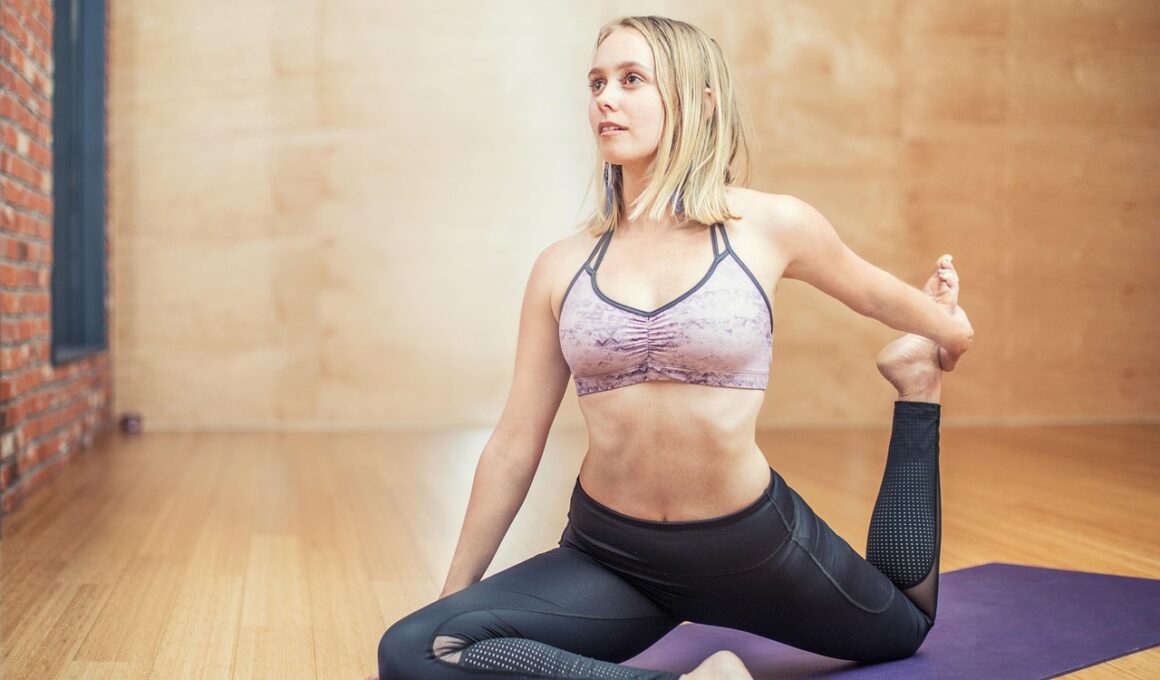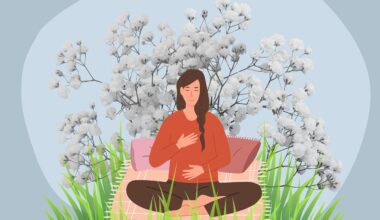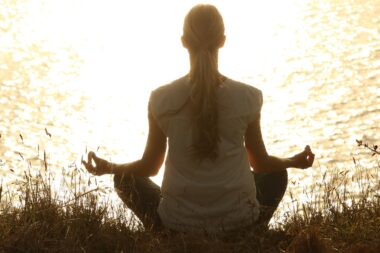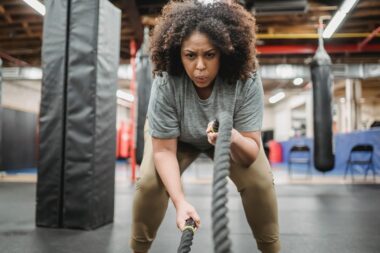Overcoming Sports Anxiety Through Yoga and Meditation
Many athletes experience sports anxiety, leading to underperformance and mental stress. Yoga and meditation offer effective tools for managing this anxiety. Through mindful breathing and focused practices, the body can relax, and athletes can build mental resilience. One powerful method is to incorporate breathing techniques into training, which calms the nervous system. This allows athletes to maintain focus in high-pressure moments, enhancing overall performance. Additionally, regular yoga practice fosters adaptability, a crucial attribute for any athlete facing unpredictability during competitions. Furthermore, athletes can benefit from visualization techniques, which enhance mental clarity and help them prepare for their events. Visualization allows the body to experience success through imagination, reducing overall anxiety levels. Hence, regularly engaging in yoga can support athletes by providing a structured mental space to tackle performance-related fears while promoting a sense of well-being. As a result, integrating these practices can lead to improved focus and reduced anxiety levels, ensuring athletes approach their sport with confidence and preparedness. Consistency is key in this practice, encouraging athletes to dedicate time to yoga and meditation, ultimately ensuring they nurture their body and mind.
The Science Behind Yoga and Meditation for Anxiety
Stress activates the body’s fight-or-flight response, increasing cortisol levels, which impacts performance negatively. Yoga and meditation effectively lower these cortisol levels, mitigating anxiety’s physical effects. By engaging in mindfulness practices, athletes can reduce tension and promote relaxation. Science shows that yoga increases flexibility and body awareness, leading to improved physical performance. Numerous studies suggest a connection between mental health and physical performance. When athletes practice yoga, they adopt poses that require focus and concentration, helping shift their mindset from anxiety to presence. Additionally, meditation primes athletes to develop a positive mental state, facilitating a more profound connection to their performance. Incorporating daily meditation—even for just a few minutes—can lead to clearer thinking, enhanced decision-making, and calmer reactions under pressure. Moreover, many elite athletes have embraced these techniques, swearing by their effectiveness for improving focus. With each practice, athletes not only enhance their strength and flexibility but also their mental discipline. For anyone involved in competitive sports, yoga and meditation should be a staple in their training regimen to cultivate mental calm and mitigate anxiety effectively.
The Role of Breathing Techniques
Controlled breathing techniques are essential in yoga and meditation practices. They’re not merely about inhaling and exhaling; they serve to promote deep relaxation and mental clarity. Athletes can utilize techniques such as “Ujjayi” breathing, which involves inhaling deeply through the nose, controlling the breath, and using a slight constriction in the throat. This method calms the mind, reduces stress, and enhances concentration during sport activities. Furthermore, consistent practice of these techniques allows athletes to control their heart rate and reduce anxiety when they feel overwhelmed. Engaging in simple breath awareness exercises before training or competition can make a significant difference in performance outcomes. An athlete’s ability to maintain steady breathing directly influences their mental state and physical performance. By learning to synchronize movements with breath, athletes develop a deeper connection between body and mind. Thus, the integration of breathing techniques into regular training regimens is vital for athletes. Regular practice not only supports performance but also fosters resilience and a positive outlook on challenges faced in athletic endeavors. Ultimately, mastering breath can empower athletes to conquer their inner anxieties.
Moreover, meditation fosters self-awareness, which is crucial for athletes managing anxiety. When athletes become aware of their thoughts and feelings, they can address them head-on, transforming negativity into constructive energy. For example, mindfulness meditation encourages athletes to observe their thoughts without judgment. By acknowledging anxiety as a natural emotion instead of fighting it, they cultivate a healthier mindset. Regular meditation allows athletes to understand their body’s stress signals and develop personalized coping strategies. This practice also aids in focusing on the process rather than outcomes, which can alleviate performance pressure. By shifting attention to the present moment, athletes can channel their energy effectively and improve concentration. These mental shifts can create a powerful ripple effect on the overall sports experience. Consequently, athletes who incorporate meditation can respond more positively to anxiety-provoking events, rather than succumbing to them. Creating a short daily routine for meditation—ideally before or after training—can further enhance its impact. Combining meditation with physical training enriches the athletic journey and nurtures overall growth both in sport and life.
Implementing a Routine
To maximize the benefits of yoga and meditation, athletes must establish a consistent routine. A daily practice doesn’t need to require long hours; even shorter sessions can yield significant results. Beginners may try incorporating ten to fifteen minutes of yoga in their warm-up or cool-down routines. For meditation, athletes can allocate a brief period during their day, possibly even at the beginning or end. Setting aside this time will help gauge the practices’ effectiveness. Additionally, utilizing guided sessions available via various apps can cater to athletes of all levels. Beginners should start slowly, choosing accessible poses and comfortable meditation techniques to avoid overwhelming themselves. As they gain confidence, they can explore more advanced techniques and longer practices. Furthermore, joining group classes can enhance motivation and foster a sense of community support. Engaging with others who share similar goals builds camaraderie and provides additional encouragement. Therefore, the integration of yoga and meditation into training can be gradual, ensuring it becomes a rewarding and sustainable habit that enhances athletic performance. Ultimately, athletes investing in these practices secure their mental game along with their physical preparedness.
Long-term Benefits for Athletes
Engaging in yoga and meditation not only benefits immediate anxiety management but also yields long-term advantages. Over time, athletes may find increased mental well-being, enhanced performance, and a more positive athletic experience. Ongoing engagement leads to improved focus, better emotional regulation, and heightened self-awareness, making these practices indispensable. Regular exposure to these techniques allows the mind to naturally enter a state of calm more readily, even in high-stress situations. Moreover, athletes can develop resilience, enabling them to recover from defeats or setbacks without falling into despair. The synergistic effects of improved physical strength and psychological health enrich an athlete’s overall journey. As stress becomes more manageable, athletes often discover greater enjoyment in their sport, further motivating them to train and strive for improvement. Additionally, enhancing mental health through these practices can lead to healthier lifestyle choices outside sports. The cumulative effect is a more balanced life, where athletes not only achieve sporting success but also cultivate fulfillment globally. Therefore, embracing yoga and meditation equips athletes with the tools necessary for long-term success and resilience.
Finally, overcoming sports anxiety through yoga and meditation is a journey, not a destination. Athletes must cultivate patience as they navigate introducing these practices into their lives. Progress may not be immediate, but consistent practice brings gradual transformation. Balancing physical training with mental practices fosters a robust athletic identity. As athletes deepen their understanding and appreciation of their mental landscape, they develop strategies to face pressures head-on. Ultimately, building a solid foundation of wellness and clarity through mind-body practices produces enduring benefits. Mental agility and resilience often distinguish great athletes from their peers. Hence, integrating yoga and meditation closely into training can immensely cultivate mental fortitude. Additionally, athletes can inspire one another to incorporate these techniques, creating a supportive network. Each participant in this journey contributes to a broader comprehension of mental health in sports, sparking discussions that elevate overall awareness. With growing relationships between sports and well-being, more athletes can embrace these tools to achieve their goals. Therefore, the journey to overcoming sports anxiety through yoga and meditation can remarkably alter an athlete’s path toward success.





